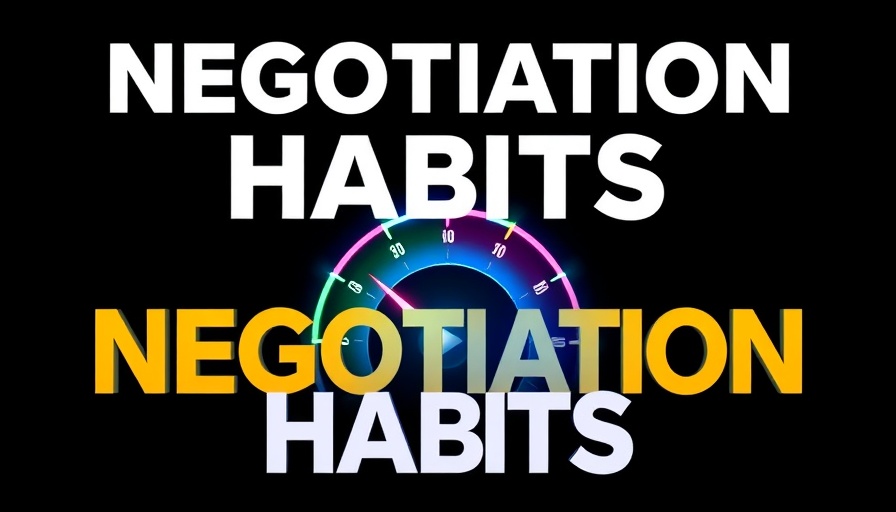
The Art of Negotiation: Why it Matters in Every Aspect of Life
Negotiation isn't just about cutting deals or sealing contracts; it's a critical skill that influences various facets of life—from climbing the corporate ladder to personal relationships. As executive and entrepreneurial success relies heavily on effective negotiation, mastering this art can determine the trajectory of your career and personal life. In this article, we'll provide invaluable insights drawn from expert negotiation techniques, highlighting five habits that can elevate your negotiation skills dramatically.
In 'Win More Negotiations: 5 Habits from Great Books', the discussion dives into effective negotiation techniques, exploring key insights that sparked deeper analysis on our end.
Master the Walk-Away Mindset: A Key to Confidence
One of the pillars of effective negotiation is the walk-away mindset. According to renowned negotiator Jim Camp, understanding that you can leave a deal at any moment is liberating. This doesn’t just reduce pressure; it enhances your negotiation stance. Visualizing alternative opportunities not only boosts your confidence but also fosters creativity in resolving issues. If, for instance, you're negotiating a salary and believe it's your one shot, you might settle for less than what you deserve. Instead, picture multiple job opportunities or projects in the pipeline that open doors for you. This mindset can transform negotiations from a stress-filled tussle into a more relaxed, strategic encounter.
Why Seeking a 'No' Can Pave the Way to a 'Yes'
It may seem counterintuitive, but getting a 'no' early in the negotiation process can build trust and lead to a more fruitful dialogue. This technique is particularly effective because it allows your counterpart to express their concerns. For example, instead of saying, "Would you like to discuss this proposal?" you might ask, "Is this a bad time to talk?" This gives them an opportunity to express their current situation without feeling cornered. By allowing them to voice objections or concerns right away, you create a safer atmosphere that can lead to a more constructive discussion.
Creating an 'Us vs. It' Atmosphere: Collaboration Over Competition
Negotiations can often feel combative, but they don’t have to be. Transforming the negotiation experience into a collaborative effort is essential for achieving mutual benefits. Language matters here: swap confrontational phrases with collaborative ones. Instead of demanding, “What do you want?” try “What should we figure out together?” This subtle shift can encourage teamwork and creativity in problem-solving. Additionally, identify common challenges you face—and let these shared issues propel your collaboration forward, resulting in solutions beneficial for both parties.
Responding with Curiosity: Using Calibrated Questions
When handed a subpar offer, the instinct might be to react negatively. But it's crucial to maintain a positive tone and respond with calibrated questions to draw your counterpart into the solution-building process. Rather than saying, "That's unfair!" turn it into a, "How am I supposed to justify this to my clients?" This approach not only disarms the situation but also evokes empathy, making it more likely that your counterpart will adjust their offer. Your goal here is to foster an atmosphere of understanding that dissuades antagonism.
Anchor Expectations: Setting the Stage for Acceptable Offers
Before laying out your offer, it's advantageous to set expectations low to make your actual offer feel more substantial. This psychological tactic is typified in scenarios where you present a worse-case scenario, allowing your actual offer to see better acceptance. For example, if you're negotiating a salary at a startup with limited resources, start by acknowledging potential misconceptions while presenting your budget. This technique not only lowers expectations but also engages your counterpart in a conversation that focuses on finding workable solutions.
Practical Insights for Everyday Negotiation
While the stakes may vary in different negotiation scenarios, the principles outlined here can substantially improve your success rate. The strategies discussed are chores you can practice daily—whether when negotiating with suppliers, engaging with colleagues, or even discussing household responsibilities. Each interaction is an opportunity to hone your skills. Adopting these habits in less intense situations gives you the mental agility needed for high-stakes negotiations when they arise.
Conclusion: Mastering Negotiation Habits for Lasting Success
The essence of negotiating is about fostering good habits that empower you to achieve positive outcomes consistently. As these habits become second nature, you'll find they provide significant advantages not just in your professional life, but in your personal relationships too. If you’re ready to elevate your negotiation techniques and drive forward your professional success, consider subscribing to industry newsletters or training programs focused on negotiation. Cultivating these essential skills can open up a wealth of opportunities for you—changes like not just winning negotiations but building lasting relationships.
 Add Row
Add Row  Add
Add 




Write A Comment